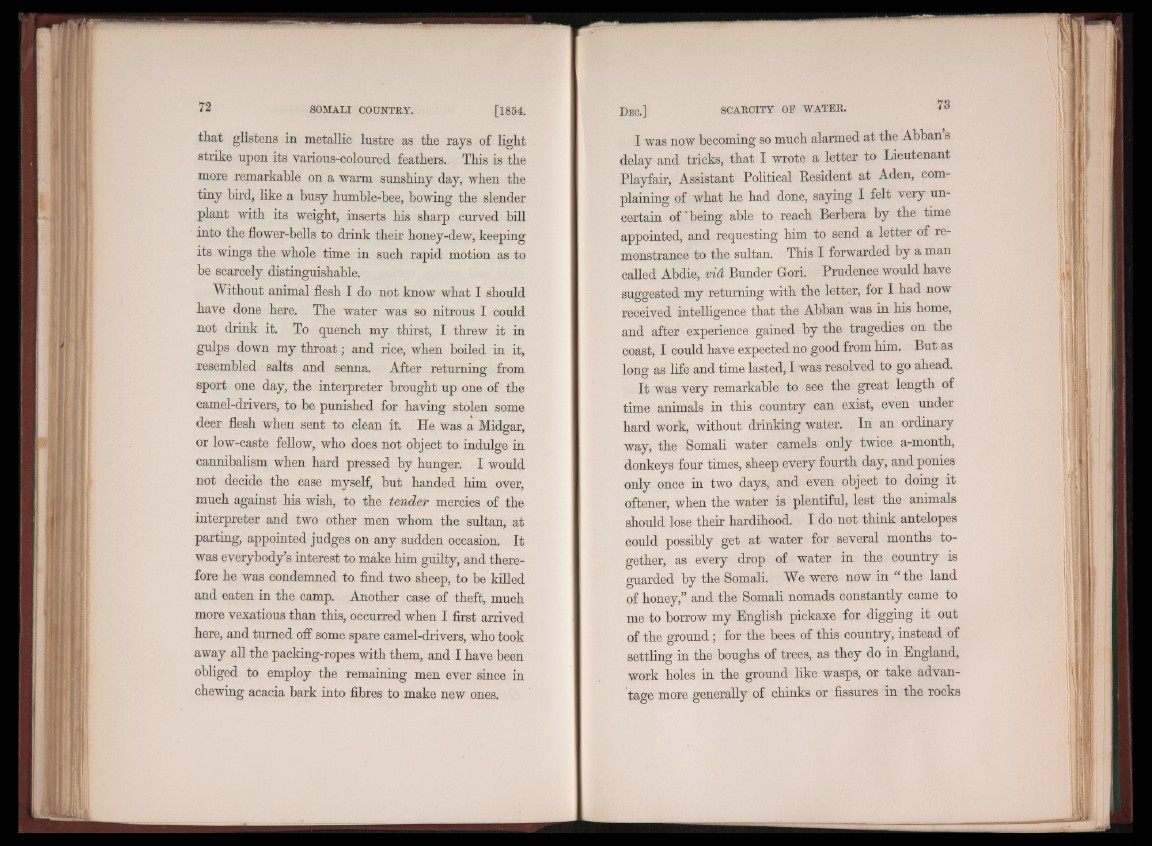
that glistens in metallic lustre as the rays of light
strike upon its various-coloured feathers.. This is the
more remarkable on a warm sunshiny day, when the
tiny bird, like a busy humble-bee, bowing the slender
plant with its weight, inserts his sharp curved bill
into the flower-bells to drink their honey-dew, keeping
its wings the whole time in such rapid motion as to
be scarcely distinguishable.
Without animal flesh I do not know what I should
have done here. The water was so nitrous I could
not drink it. To quench my thirst, I threw it in
gulps down my th ro a t; and rice, when boiled in it,
resembled salts and senna. After returning from
sport one day, the interpreter brought up one of the
camel-drivers, to be punished for having stolen some
deer flesh when sent to clean it. He was a Midgar,
or low-caste fellow, who does not object to indulge in
cannibalism when hard pressed by hunger. I would
not decide the case myself, but handed him over,
much against his wish, to the tender mercies of the
interpreter and two other men whom the sultan, at
parting, appointed judges on any sudden occasion. I t
was everybody’s interest to make him guilty, and therefore
he was condemned to find two sheep, to be killed
and eaten in the camp. Another case of theft, much
more vexatious than this, occurred when I first arrived
here, and turned off some spare camel-drivers, who took
away all the paeking-ropes with them, and I have been
obliged to employ the remaining men ever since in
chewing acacia bark into fibres to make new ones.
I was now becoming so much alarmed at the Abban s
delay and tricks, that I wrote a letter to Lieutenant
Playfair, Assistant Political Resident at Aden, complaining
of what he had done, saying I felt very uncertain
o f ’being able to reach Berbera by the time
appointed, and requesting him to send a letter of remonstrance
to the sultan. This I forwarded by a man
called Abdie, vid Bunder Gori. Prudence would have
suggested my returning with the letter, for I had now
received intelligence that the Abban was in his home,
and after experience gained by the tragedies on the
coast, I could have expected no good from him. But as
long as life and time lasted, I was resolved to go ahead.
I t was very remarkable to see the great length of
time fl.nima.1s in this country can exist, even under
hard work, without drinking water. In an ordinary
way, the Somali water camels only twice a-month,
donkeys four times, sheep every fourth day, and ponies
only once in two days, and even object to doing it
oftener, when the water is plentiful, lest the animals
should lose their hardihood. I do not think antelopes
could possibly get at water for several months together,
as every drop of water in the country is
guarded by the Somali. We were now in “ the land
of honey,” and the Somali nomads constantly came to
me to borrow my English pickaxe for digging it out
of the ground; for the bees of this country, instead of
settling in the boughs of trees, as they do in England,
work holes in the ground like wasps, or take advantage
more generally of chinks or fissures in the rocks